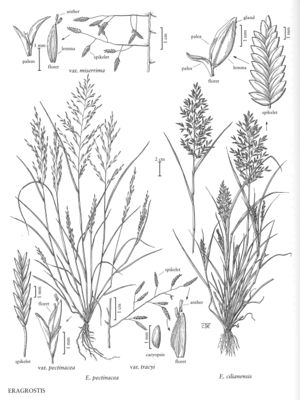Difference between revisions of "Eragrostis cilianensis"
FNA>Volume Importer |
FNA>Volume Importer |
||
| Line 23: | Line 23: | ||
-->{{Treatment/Body | -->{{Treatment/Body | ||
|distribution=Conn.;N.J.;N.Y.;Wash.;Mich.;Del.;D.C;Wis.;W.Va.;Pacific Islands (Hawaii);Mass.;Maine;N.H.;R.I.;Vt.;Fla.;Wyo.;N.Mex.;Tex.;La.;Md.;Tenn.;N.C.;S.C.;Pa.;Nev.;Va.;Colo.;Alta.;B.C.;Man.;N.S.;Ont.;Que.;Sask.;Calif.;Ala.;Kans.;N.Dak.;Nebr.;Okla.;S.Dak.;Ark.;Ill.;Ga.;Ind.;Iowa;Ariz.;Idaho;Mont.;Oreg.;Ohio;Utah;Mo.;Minn.;Miss.;Ky. | |distribution=Conn.;N.J.;N.Y.;Wash.;Mich.;Del.;D.C;Wis.;W.Va.;Pacific Islands (Hawaii);Mass.;Maine;N.H.;R.I.;Vt.;Fla.;Wyo.;N.Mex.;Tex.;La.;Md.;Tenn.;N.C.;S.C.;Pa.;Nev.;Va.;Colo.;Alta.;B.C.;Man.;N.S.;Ont.;Que.;Sask.;Calif.;Ala.;Kans.;N.Dak.;Nebr.;Okla.;S.Dak.;Ark.;Ill.;Ga.;Ind.;Iowa;Ariz.;Idaho;Mont.;Oreg.;Ohio;Utah;Mo.;Minn.;Miss.;Ky. | ||
| − | |discussion=<p | + | |discussion=<p>Eragrostis cilianensis is an introduced European species that now grows in disturbed sites such as pastures and roadsides, at 0-2300 m, through most of the contiguous United States and southern Canada. The English name refers to the odor of fresh plants.</p> |
|tables= | |tables= | ||
|references= | |references= | ||
| Line 39: | Line 39: | ||
|basionyms= | |basionyms= | ||
|family=Poaceae | |family=Poaceae | ||
| + | |illustrator=Linda A. Vorobik and Cindy Roché | ||
|distribution=Conn.;N.J.;N.Y.;Wash.;Mich.;Del.;D.C;Wis.;W.Va.;Pacific Islands (Hawaii);Mass.;Maine;N.H.;R.I.;Vt.;Fla.;Wyo.;N.Mex.;Tex.;La.;Md.;Tenn.;N.C.;S.C.;Pa.;Nev.;Va.;Colo.;Alta.;B.C.;Man.;N.S.;Ont.;Que.;Sask.;Calif.;Ala.;Kans.;N.Dak.;Nebr.;Okla.;S.Dak.;Ark.;Ill.;Ga.;Ind.;Iowa;Ariz.;Idaho;Mont.;Oreg.;Ohio;Utah;Mo.;Minn.;Miss.;Ky. | |distribution=Conn.;N.J.;N.Y.;Wash.;Mich.;Del.;D.C;Wis.;W.Va.;Pacific Islands (Hawaii);Mass.;Maine;N.H.;R.I.;Vt.;Fla.;Wyo.;N.Mex.;Tex.;La.;Md.;Tenn.;N.C.;S.C.;Pa.;Nev.;Va.;Colo.;Alta.;B.C.;Man.;N.S.;Ont.;Que.;Sask.;Calif.;Ala.;Kans.;N.Dak.;Nebr.;Okla.;S.Dak.;Ark.;Ill.;Ga.;Ind.;Iowa;Ariz.;Idaho;Mont.;Oreg.;Ohio;Utah;Mo.;Minn.;Miss.;Ky. | ||
|reference=None | |reference=None | ||
| Line 44: | Line 45: | ||
|publication year= | |publication year= | ||
|special status= | |special status= | ||
| − | |source xml=https:// | + | |source xml=https://bibilujan@bitbucket.org/aafc-mbb/fna-data-curation.git/src/314eb390f968962f596ae85f506b4b3db8683b1b/coarse_grained_fna_xml/V25/V25_134.xml |
|subfamily=Poaceae subfam. Chloridoideae | |subfamily=Poaceae subfam. Chloridoideae | ||
|tribe=Poaceae tribe Cynodonteae | |tribe=Poaceae tribe Cynodonteae | ||
Revision as of 17:15, 30 October 2019
Plants annual; tufted, without innovations. Culms 15-45(65) cm, erect or decumbent, some¬times with crateriform glands below the nodes. Sheaths glabrous, occasionally glandular, apices hairy, hairs to 5 mm; ligules 0.4-0.8 mm, ciliate; blades (1)5-20 cm long, (1)3-5(10) mm wide, flat to involute, abaxial surfaces glabrous, sometimes glandular, adaxial surfaces scabridulous, occasionally also hairy. Panicles (3)5-16(20) cm long, 2-8.5 cm wide, oblong to ovate, condensed to open; primary branches 0.4-5 cm, appressed or diverging 20-80° from the rachises; pulvini glabrous or hairy; pedicels 0.2-3 mm, stout, straight, stiff, usually divergent, occasionally appressed. Spikelets 6-20 mm long, 2-4 mm wide, ovate-lanceolate, plumbeous, greenish, with 10-40 florets; disarticulation below the florets, each floret falling as a unit, rachillas persistent. Glumes broadly ovate to lanceolate, membranous, usually glandular; lower glumes 1.2-2 mm, usually 1-veined; upper glumes 1.2-2.6 mm, often 3-veined; lemmas 2-2.8 mm, broadly ovate, membranous, keels with 1-3 crateriform glands, apices obtuse to acute; paleas 1.2-2.1 mm, hyaline, keels scabrous, sometimes also ciliate, cilia to 0.3 mm, apices obtuse to acute; anthers 3, 0.2-0.5 mm, yellow. Caryopses 0.5-0.7 mm, globose to broadly ellipsoid, smooth to faintly striate, not grooved, reddish-brown or translucent. 2n = 20.
Distribution
Conn., N.J., N.Y., Wash., Mich., Del., D.C, Wis., W.Va., Pacific Islands (Hawaii), Mass., Maine, N.H., R.I., Vt., Fla., Wyo., N.Mex., Tex., La., Md., Tenn., N.C., S.C., Pa., Nev., Va., Colo., Alta., B.C., Man., N.S., Ont., Que., Sask., Calif., Ala., Kans., N.Dak., Nebr., Okla., S.Dak., Ark., Ill., Ga., Ind., Iowa, Ariz., Idaho, Mont., Oreg., Ohio, Utah, Mo., Minn., Miss., Ky.
Discussion
Eragrostis cilianensis is an introduced European species that now grows in disturbed sites such as pastures and roadsides, at 0-2300 m, through most of the contiguous United States and southern Canada. The English name refers to the odor of fresh plants.
Selected References
None.
